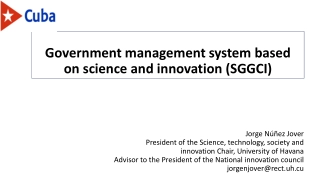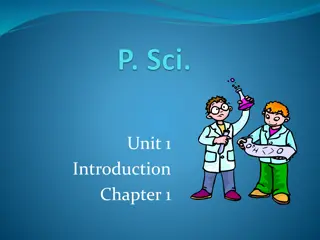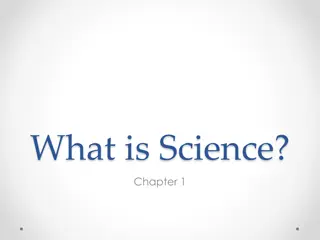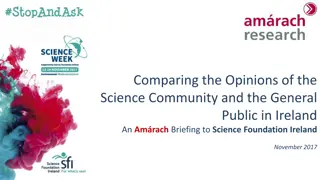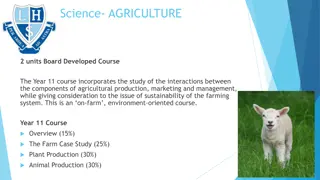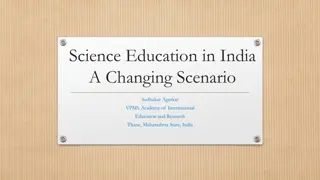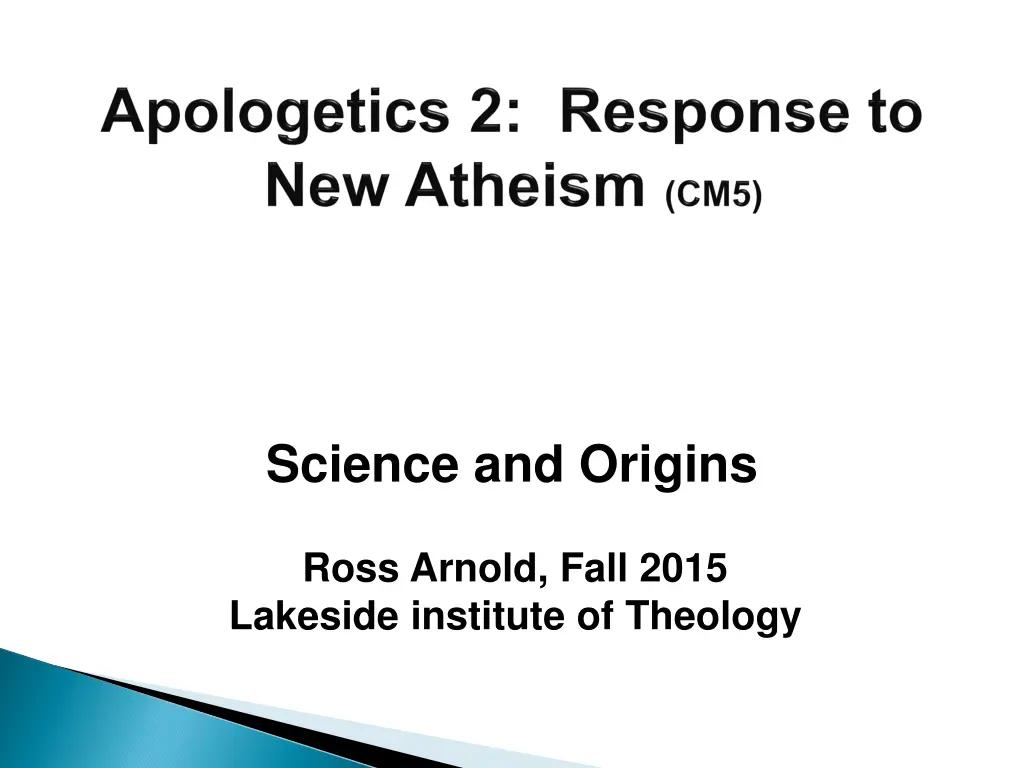
Darwinism versus Christianity: A Critical Analysis
Explore the clash between Darwinism and Christianity, examining the scientific and religious perspectives on origins. Delve into the debate on evolution, natural selection, and the implications for faith in a secular world. Understand the challenges faced by believers in defending their views in a society dominated by a naturalistic worldview.
Download Presentation

Please find below an Image/Link to download the presentation.
The content on the website is provided AS IS for your information and personal use only. It may not be sold, licensed, or shared on other websites without obtaining consent from the author. If you encounter any issues during the download, it is possible that the publisher has removed the file from their server.
You are allowed to download the files provided on this website for personal or commercial use, subject to the condition that they are used lawfully. All files are the property of their respective owners.
The content on the website is provided AS IS for your information and personal use only. It may not be sold, licensed, or shared on other websites without obtaining consent from the author.
E N D
Presentation Transcript
Science and Origins Ross Arnold, Fall 2015 Lakeside institute of Theology
Apologetics 2 (CM5) Oct. 2 Introduction Oct. 9 Faith and Reason Oct. 16 Mid-Term Break Oct. 23 Science and Origins Oct. 30 Science and Origins 2 Nov. 6 Morality, Suffering and Violence Nov. 13 The Influence of Religion Nov. 20 Conclusion; Final Exam
But in your hearts revere Christ as Lord. Always be prepared to give an answer to everyone who asks you to give the reason for the hope that you have. But do this with gentleness and respect, 16 keeping a clear conscience, so that those who speak maliciously against your good behavior in Christ may be ashamed of their slander. 1 Peter 3:15-17 The defense of the faith is not a luxury or intellectual vanity. It is a task appointed by God that you should be able to give a reason for the hope that is in you as you bear witness before the world. R. C Sproul
Most Americans believe in God; fewer hold to a naturalistic, Darwinian view of life. But Darwinians claim the dominant position, insisting: 1) Darwinism is scientifically established beyond a reasonable doubt; 2) any challenges to Darwinism are religiously based and are, therefore, unscientific and irrational; 3) any challenge to Darwinism in the public square violates the constitutional separation of church and state and must be legally opposed lest we turn into a theocracy; and 4) the scientific establishment is an open marketplace of ideas with little or no biases.
If Darwinism is true, it is much less likely that Christianity is true. Darwinism is foundational to the secular worldview that wants to marginalize religious faith as having no claim on knowledge. As Richard Dawkins has said: Darwinism allows one to be "an intellectually fulfilled atheist. Darwinism gives strength to atheism. Skeptics and atheists have long employed Darwinism as a defeater of Christianity and theism, claiming that undirected evolution replaces design, with every aspect of the development of species and of the human body explained by the operations of nature, natural selection and the background conditions of the universe.
Fundamentalists are attempting to inject religion into the science curriculum again by censoring Darwinism in the public schools. This denial of church-state separation is being challenged by the ACLU. Parents and children have the right to believe whatever they want religiously, but the teaching of science leaves no room for personal and religious beliefs to be taught in the public classroom. If the creationists had scientific evidence for their position, they could have made their case in the professional peer-reviewed journals, which are the testing ground of theories. But they have not done so. Therefore, they have no claim on being scientific.
1) Belief in Darwinism as a comprehensive explanation for the biosphere has become a deterrent to Christian faith. The entrenched Darwinian ideology is an obstacle to the discussion and teaching of God's intervention in creating life and setting humans apart in nature. The de facto establishment of naturalism in science (and culture at large) has a vise-grip on most of the public discourse on science. 2) Darwinism suffers from fatal flaws both logically and evidentially. It is far less well-supported than commonly thought. It thus opens a door for Christian apologetics that would otherwise be closed.
Darwinists reject all criticisms of Darwinism as religiously based, unscientific and unworthy of serious attention. But it is false that all significant critiques of Darwinism come from religious sources. In recent years a variety of thinkers have argued against Darwinism without appealing to any religious sources. Since 2001, over 900 scientists of various worldviews have signed a published statement questioning the legitimacy of Darwinism: We are skeptical of claims for the ability of random mutation and natural selection to account for the complexity of life. Careful examination of the evidence for Darwinian theory should be encouraged.
Theistic evolution God created the universe and let inherent properties of the universe produce the first life and subsequent species, without any direct involvement of a designing intelligence. Scientific creationism God created the universe and all life in six twenty-four-hour days not more than about ten thousand years ago. Progressive or Day-Age creationism flexible on creation timetable and chronology, but insistent God created ex nihilo; made each species especially, while allowing for microevolution; time lapsed between stages of creation; humans created, not evolved; Fall of first humans really happened.
Descent with modification the idea that nature favors organisms that evolve adaptively and reproduce abundantly; it judges the unfit with sterility and death. The fittest survive and reproduce. Given enough time, this process of natural selection leads to the development of entirely new species, which appear through a gradual process of incremental change. The neo-Darwinian synthesis Later Darwinists, appealing to the genetic discoveries of Gregor Mendel (not a Darwinist), filled out Darwin's theory by claiming random genetic mutations supplied the means by which organisms changed into new species.
An unwavering commitment to materialism We take the side of science in spite of the patent absurdity of some of its constructs, in spite of its failure to fulfill many of its extravagant promises of health and life, in spite of the tolerance of the scientific community for unsubstantiated just-so stories, because we have a prior commitment, a commitment to materialism. It is not that the methods and institutions of science somehow compel us to accept a material explanation of the phenomenal world, but, on the contrary, that we are forced by our a priori adherence to material causes to create an apparatus of investigation and a set of concepts that produce material explanations, no matter how counterintuitive, no matter how mystifying to the uninitiated. Moreover, that materialism is an absolute, for we cannot allow a Divine Foot in the door. Richard Lewontin, Darwinian biologist
The color of moths? The finch beak variations? Evolutionary extrapolation? Ontogeny recapitulates phylogeny? Darwin's tree of life? Transitional forms? Do we have a common ancestor? Homology: Darwinian or designed? Vestigial organs and systems? We therefore are left with a strong opening for Intelligent Design.
"It makes no difference whether a scientific theory comes from a dream, the Bible or bathroom graffiti. The issue is whether independent scientific reasons are given for it. J.P. Moreland Principle of Irreducible Complexity 1. Molecular machines evidence specified complexity (i.e., contingent, complex and specified). 2. Specified complexity cannot be explained on the basis of chance or necessity, or the combination of chance and necessity. 3. Intelligent agency is a known cause which produces specified complexity. 4. Therefore, best explanation for specified complexity in molecular machines is intelligent design.
The Fine-Tuning Teleological Argument A version of the teleological argument, this is based on scientific discoveries of cosmic constants which have existed since the Big Bang. If the values of the cosmic constants were even very slightly different, life on earth would not be possible. 1. Rate of Expansion of the Universe. If this were different by as little as 1/1060 the universe would either have collapsed or would have expanded too rapidly for stars to form. 2. Strong Nuclear Force. If the force that binds protons and neutrons together had been even 5% stronger or weaker, life would not have been possible. 3. Force of Gravity. If gravity had been stronger or weaker by even 1/1040 then stars which can support life (like our sun) would not have been formed.
Paleys Teleological Argument The argument from design, or watchmaker argument says that the complexity of the world demands belief in a Creator, in the same way that the complexity of a watch demands belief in a watchmaker. The argument goes like this: 1. A watch has many complex parts, works a specific and intentional function, and is intelligently designed to achieve that function. 2. Similarly, the world has many complex parts, works a specific and intentional function (esp. the sustaining of life), and is intelligently designed to achieve that function. 3. Therefore, there is a very high probability that the world like the watch was intelligently designed by a Creator.
Kalam Cosmological Argument a modern re-formulation of the cosmological argument, which has served as a key component of the revival of Christian apologetics in response to the New Atheism. The argument goes like this: 1. Everything that begins to exist has a cause; 2. The universe began to exist; 3. Therefore, the universe has a cause. 4. If the universe has a cause, then an uncaused, personal Creator of the universe exists, who is beginningless, changeless, immaterial, timeless, spaceless and enormously powerful; 5. Therefore: an uncaused, personal Creator of the universe exists, who is beginningless, changeless, immaterial, timeless, spaceless and enormously powerful.

